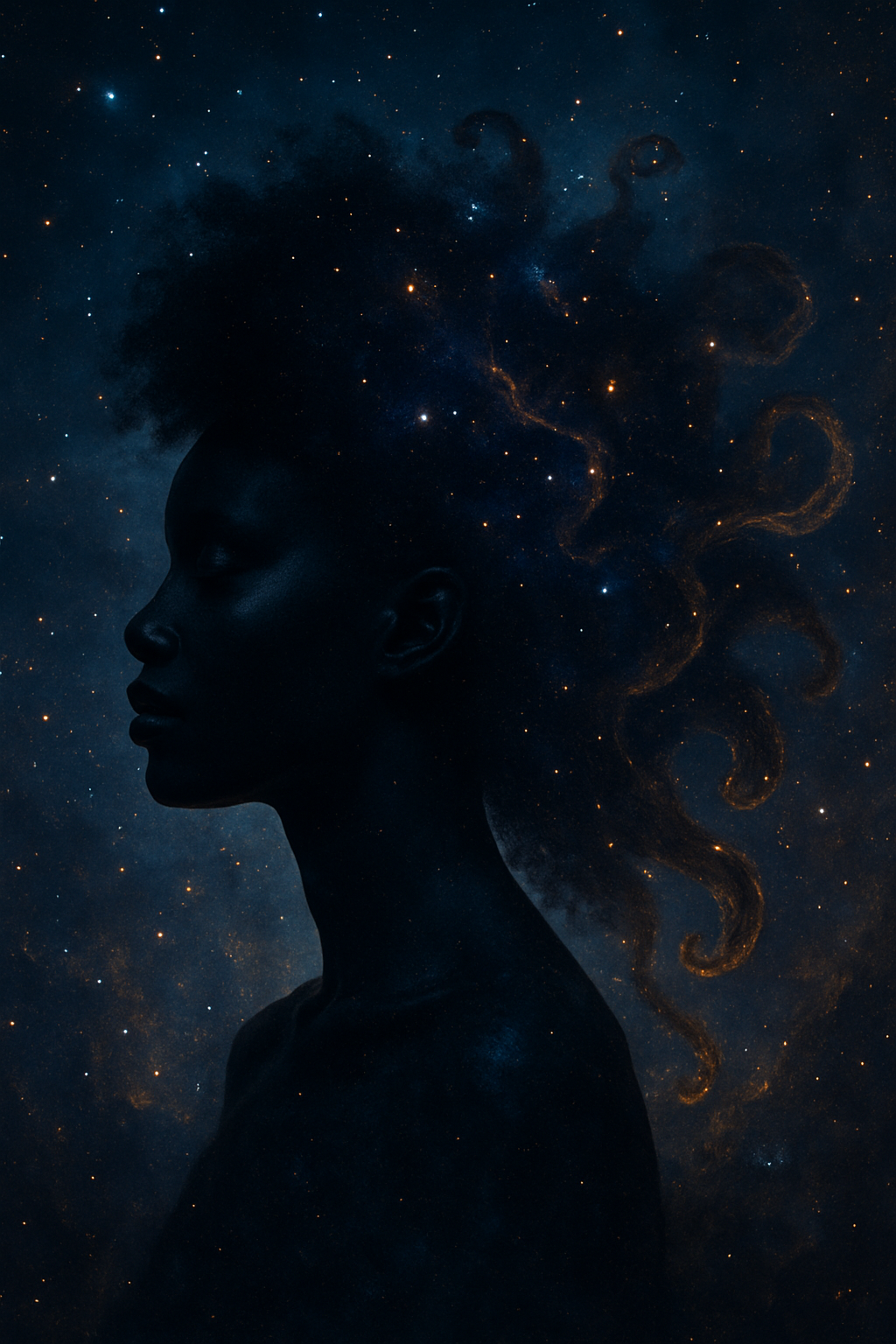Decolonizing Beauty Through Self-Worship: A Ritual for Reclaiming your Reflection
Expanding Language, Erotic Intelligence & Beauty as Ritual
Previously, we explored essential language to anchor ourselves in an intersectional understanding of intimacy—both online and offline. SXII Concepts are crucial for collective quantum leaps, laying the foundation for galactic consciousness and expanded erotic intelligence. Language is a powerful tool that shapes how we navigate both individual and interpersonal experiences. And we won’t stop here—we’ll continue revisiting and expanding this lexicon. (The SXII Thesaurus is on its way!)
Today, we will examine the decolonization of beauty through self-worship, engaging in rituals aimed at reclaiming our reflections. Furthermore, we’ll touch on the historical contexts of colorism, sexism, and texturism, exploring how beauty has been intertwined with the erotic to uphold power structures. Additionally, we will explore the politics of beauty, focusing on how familial influences shape our spiritual and physical self-perceptions.
Also introducing practical rituals to integrate into your skincare routine—pathways to mirror meditations and deeper self -worship. Some may call this glamor magic, but at its core, it’s a practice of cultivating comfort and presence in your own reflection. I’ll share personal anecdotes, offering glimpses into how these rituals have guided my healing and reclamation of self.
As technology and culture continue to evolve, cultivating Erotic Intelligence (EI) is more crucial than ever—holding us accountable for our interactions, both online and offline.
This is especially important when developing our authentic selves, with the internet acting as an extension of that authenticity—whether we’re indulging in fantasy, embodying our enthusiastic aliases, or ethically engaging in anonymity. Our shadows, qualms, and insecurities have a way of raging online. Recognizing this, there is a pressing need for outlets to process our emotions, preventing technology from bearing the weight of unaddressed feelings. By deepening these concepts, we advocate for combating toxic technology with enhanced social cohesion through compassionate expression.
A pivotal step in reclaiming our agency involves decolonizing beauty through self-worship, engaging in rituals that reclaim our reflections. Our journey toward social change (the act of participating in human revolution) begins with personal reflection, diligently polishing both our spiritual and physical mirrors.
To elucidate, here are three core concepts: Quantum Beauty, Vanity, and Self-Worship, and their interrelations.
👉 Quantum beauty represents the fusion of futurism, sensual wisdom, and self-expression—a radical act transforming our self-experience through ritual, frequency, and deep presence.
❌ Vanity is often rooted in external validation, comparison, and control.
✅ Self-worship is about devotion, sovereignty, and pleasure.
Let’s tap in deeper…
1. Decolonizing Beauty
If the concept of decolonizing beauty is new to you, let me start by saying this:
Beauty has historically been weaponized to determine who is deemed worthy of humanity and who is not. Socially constructed metrics, upheld by those in power, become internalized and enforced by the masses, leading people to police one another while using these standards to anchor their own sense of worthiness. Beauty operates as an oppression Olympics—interwoven with colorism, ableism, classism, and ageism, shaping how we navigate fear. To decolonize beauty is to critically examine how social objectification molds our perception of humanity—our own and others'. More importantly, it’s about transmuting objectification into interpersonal power—without erasing another person’s agency in the process.
On a macro level, collective attitudes about beauty are weaponized to maintain societal norms. So, ask yourself:
- How do you determine if you’re “normal” or not?
- What about your perceptions of beauty reinforces your own subjugation?
Yes, beauty standard exist— and they’re constantly changing . Decolonizing beauty allows us to admire external aesthetics while simultaneously participating in a wellness practice that expands access intimacy (a term coined by Mia Mingus) and lets humanity breathe.
This practice starts with how we view ourselves. Sometimes, our opinions aren’t our own—they’re perceptions ingrained in us long ago, or projections passed down through family. Either way, we all deserve to feel enriched in our bodies.
2. The Politics of Beauty & How We Got Here
We can all agree—colonialism, neocolonialism, texturism, and other forms of oppression have shaped beauty standards. But what happens when beauty is paired with the erotic as a tool to enforce and maintain these principles?
Body ideals are often invisible to those who haven’t unpacked them.
Radical reclamation is a process. I’ve screamed in front of the mirror more times than I can count—sometimes mourning for my ancestors, sometimes grieving or my community, and sometimes feeling pain that wasn’t even mine to carry.
However, beauty as a familial politic has scarred me more that I’d previously been willing to admit. Shaming folks for how they look was commonplace, comparing darker folk to fair-sinned kin, or making unsolicited comments—these small, insidious moments impacted my formative memories of beauty standards.
Over time, as an esthetician, I became familiar with experience of my clients, their lived experience similar to that of my own, I profoundly inner-stand how the familial can become the cultural, embedding itself in our sense of self.
Historical Context: Beauty & Oppression
Historically, beauty has been weaponized through the erotic —its allure manipulated as a tool of sexual exploitation and oppression:
- Fancy maids during slavery – Black Women, with a higher price value for lighter-skinned BW were sold into sex labor.
- Buck breaking – The use of sodomy as punishment for rebellious Black men, often performed in front of the community.
- Other violent, power-wielding, and sexually exploitative practices that remain embedded in America’s erotic landscape today.
Pause, I know that was a lot to read. History’s thick and heavy sometimes.
💭 Reflection question: How have these inherited narratives shaped our relationship with beauty today?
3. Praise Kink: Turning Beauty into Devotion
Raise your hand if you have a praise kink.
Raise your hand if you're open to incorporating praise kink into your beauty regimen.
I certainly do. I started using praise kink as a form of self-worship while healing from heartbreak in 2020. Before that, I had mostly experienced it in the BDSM community.
But now, as a regular practice, it has elevated my self-concept in the most grounded ways.
I had to reframe self adornment as ritual rather than a performative act for others. Self-worship is not soulless vanity—it’s evolving intentional care with admiration, appreciation, and reverence.
4. A Self-Worship Ritual to Reclaim Your Beauty
A practical guide:
- After showering, fully undressed, release out loud any negative feelings you have about your body ( this can even be done while towel drying off your body).
- Moisturize your skin with intention—slow down. If you feel called to, give yourself a massage. Otherwise, simple mindfulness is enough.
- For deeper emotional releases, yell at the person, memory, or phrase that planted unsavory thoughts about yourself in the mirror.
- Send warmth and compassion to those struggling with body dysmorphia via lighting a candle, moment of silence, or send good vibes. Metaphysical support is a beautiful collective cause.

5. Closing: A Call to Worship Yourself
Self-worship is a radical act—one that allows us to process emotions, reclaim agency, and solidify our sense of self. Close your eyes. If your body could speak, what would it say about how it has been seen?
🔮 If you'd like a personalized beauty ritual, explore my 1:1 coaching and ritual sessions [here].
Drop a comment: What’s one way you’ll honor your Reflection today? Let’s hold space for each other.
With Sultry Smiles, ✨


